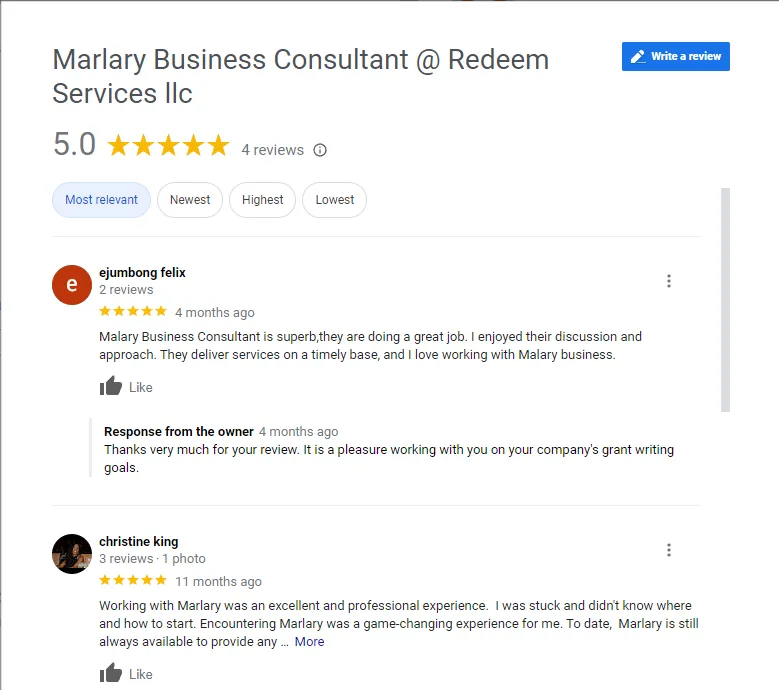BUSINESS & NON-PROFIT STARTUP SOLUTIONS
A simplified business filing process that ensures your new business starts the right way, maintains legal compliance, and becomes profitable.
PROFESSIONAL SOLUTIONS FOR ENTREPRENEURES
OUR SERVICES
Business Planning, Loans & Grant support Consultation

business &
Non-Profit Formation

Annual Compliance & REGISTERED Agent Service

RESOURCES &
Community

About Us

Established in 2020, Redeem Services LLC is a family-owned and operated business providing services guided by faith. We offer easy solutions for new and aspiring entrepreneurs to start, scale, and grow their businesses while staying legally compliant.
Our Mission:
Our goal is to make it easy for new businesses to start and grow while staying compliant. We're here to help you navigate the complexities, build a strong foundation, and support your growth. Think of us as your business bestie, guiding you through planning, legal matters, regulations, and securing the funding you need. As a family-run business, we operate with integrity.
Our Vision:
We envision becoming the go-to partner for startups, making success simple and ethical. We aim to lead in assisting businesses with paperwork and annual compliance, guiding you through the challenging aspects. Our vision is a future where Redeem Services is renowned for helping businesses thrive with integrity and excellence.
Who We Help:
Empowering New women CEO's to achieve their entrepreneurial dreams. We Provide expert guidance and support for business successes.
Our Story:
Established by a seasoned business consultant with a passion for helping women achieve financial independence and flexibility.
CLASSES A YEAR
AWARDS
YEARS OF EXPERIENCE
CLIENTS
REAL TIME GOOGLE REVIEW


TESTIMONIALS
"I recently worked with Redeem Services on a business plan, with Marlary guiding the process. Her communication was excellent, addressing my questions promptly and keeping me informed throughout. Marlary not only delivered the plan on time but also contributed valuable insights that significantly improved its quality. Her expertise in financial projections was particularly impressive, and she even took the initiative to begin pursuing grants for our startup. Marlary's professionalism and Redeem Services' quality of service were instrumental in shaping our business strategy and securing our initial funding. I highly recommend Marlary and Redeem Services for their expertise and dedication."
Tracy L.
Common FAQs for Starting A Business
Why Incorporate Your Business?
Incorporating your business or forming an LLC is a smart move to protect your personal assets. Here’s why:
1. Shield Your Personal Assets: Incorporating creates a separate business entity, so your personal assets are protected from business liabilities.
2. Tax Flexibility: Incorporation offers more options for handling taxes. Talk to your CPA or tax advisor for advice tailored to your situation.
3. Boost Business Credibility: An incorporated business appears more professional and trustworthy.
4. Privacy Protection: Keep your personal name and home address private by representing your business as a separate entity.
5. Build Business Credit: Start establishing your business credit profile.
6. Protect Your Brand: Secure your business name and brand within your state.
Incorporation is a powerful step toward building a solid foundation for your business.
Can I Reserve a Business Name?
Yes, you can!
And Redeem Services can help you with that. Reserving a business name involves filing with the Secretary of State’s office to hold a business name until you’re ready to incorporate or form an LLC.
Here’s what you need to know:
Reservation Period: Typically, a name reservation lasts for 30-90 days.
After Expiry: Once the reservation period expires, the name becomes available for anyone to use.
Reserving your business name is a great way to secure it while you prepare to officially start your business.
What is a Sole Proprietorship?
A Sole Proprietorship is the simplest structure for operating a business owned by one person (or a married couple). By default, states will consider a single-owner business to be a Sole Proprietorship unless the owner (the sole proprietor) files business registration paperwork to form an LLC (Limited Liability Company) or a Corporation. Sole Proprietors are not considered employees of their companies. They get paid by withdrawing funds (taking “owner’s draws) out of their businesses for personal use. Many freelancers, consultants, and other professional service providers work as Sole Proprietorships.
The Sole Proprietorship structure is also attractive to entrepreneurs in other industries, too (retail, landscaping, cleaning, and more).
It’s common for entrepreneurs to start as Sole Proprietorships and then register their companies as formal business entities when they begin to grow or expand their businesses.
What is a Partnership?
A partnership is a legal entity where two (or more) people run a business. Like a sole proprietorship, each partner owns a portion of the assets and liabilities of the business. The main difference is that a partnership relies on an agreement between the partners. This document, the partnership agreement, details ownership, and responsibilities.
What is a Limited Liability Company (LLC)?
An LLC (Limited Liability Company) is a hybrid of a sole proprietorship/partnership and corporation. This structure is very popular among small businesses, and for good reason. The LLC limits the personal liability of the owners, but doesn’t require much of the heavy formality and paperwork of the corporation. This makes it a great choice for business owners that want liability protection but don’t want to deal with exhaustive meeting minutes, addendum filings or other paperwork you’d need to file as a corporation.
What is a C Corporation?
A C Corporation is a standard corporation. It is considered a separate entity from its owners. This means that the corporation is responsible for any of its debts and liabilities. This is often called the “corporate shield” as it protects the owner’s personal assets from debts and liabilities of the business.A corporation has a formal structure consisting of shareholders, directors, officers, and employees. Every corporation must select at least one person to serve on its board of directors and officers are required to manage the day-to-day activities of the company. As a separate business entity, a corporation files its own tax returns. As a C corporation owner, you’ll need to file both a personal tax return and a business tax return. In some cases, this can result in a “double taxation” burden for small business owners (see the question on double taxation below for more details).
What is an S Corporation?
An S Corporation begins its corporate existence similar to a C Corporation: Articles of Incorporation must be prepared and filed with the state office. Once filed, a “general for profit” corporation has been formed.
Next, the board of directors must meet and resolve to elect S Corporation status. This is achieved by preparing and filing IRS Form 2553 with the IRS. Some states also require a similar filing at the state office before a corporation will be recognized as an S Corporation for STATE tax purposes.
What is a DBA?
Whether that name is legally registered with the business’s home state or not, every business has a legal name. A DBA (or “Doing Business As” is a name that is different from the legal name of the company. A DBA is also referred to as the “trade name,” “assumed business name,” or a “fictitious business name.”A DBA lets the public know the true owner of a business. DBA laws are consumer protection laws. They exist, so consumers have full transparency on which companies they are transacting business with. In other words, DBAs prevent dishonest business owners from running a company under a different name to avoid legal problems.
What is the difference between a C Corporation and S Corporation?
Corporations are subject to double taxation as described above. A C Corporation entity is required to pay tax at the corporate level. An S Corporation is considered a pass-through entity for tax purposes. This means that the company’s profits and losses are passed through to the individual shareholder’s tax return (and each shareholder is typically taxed on the company’s profits based on their share of stock ownership).
What Is the difference between how LLCs and S Corporations are taxed?
Both the LLC and S Corporation structures are taxed on a pass-through basis. Income taxes are paid at the individual owner level rather than at the entity level. Profits and losses get reported on the owners’ personal tax returns. However, although LLCs and S Corporations are both pass-through entities, there are some differences in how taxes are handled.Self-employment tax – Income of an LLC flows to the members involved with the business and is subject to self-employment tax. With an S Corporation, only salaries are subject to self-employment tax. Therefore, any distributions that paid out to S Corporation owners are not subject to Social Security and Medicare taxes. Tax flexibility – The LLC offers a lot more flexibility in terms of how owners can be taxed. With an LLC, owners can determine their allocations for the year and be taxed accordingly. With an S Corporation, owners must be taxed based on their pro-rata ownership interests.
For example, if one owner owns 50 percent of the business, then that person will be taxed on 50 percent of the company’s profits.
Where should I form my LLC or C Corporation?
You often hear of companies incorporating in Delaware, Wyoming, or Nevada. That’s because Delaware offers flexible, pro-business statutes, while Wyoming and Nevada feature low filing fees as well as no state corporate income, franchise, or personal income taxes. However, as a general rule of thumb, if your business will have fewer than five members or shareholders, you should form your business in the state where you actually live or where your business has a physical presence (such as an office.) When you incorporate in a different state from your physical presence, you’ll need to deal with added fees and paperwork, since you’re considered “operating out of state.” And for most small businesses, the added hassle and fees just aren’t worth it.
How can I create my new business?
There are three common methods for incorporating or forming an LLC. Each has its pros and cons, depending on your needs:
Do-it-yourself: DIY is the lowest cost method, but you’ll need to do everything yourself. This is the best option if you’re more interested in saving money than time. With this route, you need to be able to deal with lots of details and arbitrary rules.
Online legal filing service: This option is slightly more expensive than DIY. An online legal filing service will complete and file the documentation for you. Like any legal document, the articles of incorporation and application are full of tedious details. A professional service like www.redeemservicesllc.com can make sure that your application is done right and processed smoothly.
Lawyer: This is the most expensive option, but may be necessary in certain situations. For example, if you have complex requirements for how your stock should be allocated or you are working with millions of dollars, then you should turn to expert advice.
Whichever method you choose, you may want to speak with a tax professional to determine what business structure will be the best for your particular circumstances.
How much will it cost to start my new business?
Formation fees will vary by state, however, if you’d like https://redeemservicesllc.com/saas-sales to provide assistance, we do offer an easy-to-use price list so you can see the exact price for each service CorpNet offers.
When is the best time to incorporate or form an LLC?
In most cases, it’s best to incorporate or file an LLC as soon as possible. After all, the main benefit is liability protection and by waiting to incorporate, you can be exposing yourself to liability.Keep in mind that your corporation’s start date is not retroactive. This typically means filing two business income tax returns for the year. For example, if your corporation was formed on June 1, you’ll need to file as a sole proprietor (or whatever your previous entity may have been) from Jan. 1 – May 31 and then file as a corporation from June 1 – Dec. 31.
What is a Registered Agent?
LLCs must designate a registered agent in the state(s) where the company is registered. A registered agent (sometimes referred to as a resident agent) is a person or company officially recognized by the state that resides within the state of incorporation. It is designated by the LLC to accept service of process on behalf of the company. A registered agent may be an individual or another business entity with a physical location in the state of incorporation.Please note that a post office box or other mail service (e.g., UPS) is usually not sufficient to qualify as a registered agent.
The agent is responsible for accepting official notices from the Secretary of State and service of process in the event the corporation is sued.
An LLC’s registered agent must be available Monday through Friday from 8 am to 5 pm at the location specified on the LLC’s Articles of Organization. The registered agent’s name and address are public information, therefore giving some privacy protection to an LLC’s owners.
Why do I have to have a Registered Agent?
The Registered Agent must be available Monday – Friday 8am to 5pm at the location specified on your Articles in order to accept service of process. The registered agent’s name and address are public information. If you wish to keep your company’s address information confidential, designating CorpNet™ to act as your registered agent affords you that extra added layer of privacy.
What are Articles of Organization?
The articles of organization is a legal document containing important information about the business. The Secretary of State office must approve the document for the LLC to be recognized as a legal entity. Filing articles of organization officially registers the company as an LLC with the state and establishes it as a separate legal entity from its owners (which are called members). That legal separation between owners personally and their business is one of the main drivers for entrepreneurs to form an LLC. In most instances, members are not held liable personally for the company’s legal and financial problems. That gives business owners some peace of mind that their personal assets (e.g., home, vehicles, retirement funds, etc.) will not be at risk if the LLC is sued or cannot pay its debts.After receiving state approval of its articles of organization, an LLC is considered “domiciled” in that state (i.e., the state becomes the company’s “home” state). The business goes on record as a domestic LLC in the state, obligated to operate according to that state’s laws and codes.
What are Articles of Incorporation?
Articles of incorporation is a legal document containing important information about the company, and it must be approved by the Secretary of State office.
Filing Articles of incorporation registers the company as a corporation (C Corporation) with the state. It makes the business a separate legal and tax-paying entity from its owners, giving its incorporators and shareholders personal liability protection from the company’s legal and financial problems. After receiving state approval of its articles of incorporation, a business is considered “domiciled” in that state (in other words, the state is the corporation’s “home” state). The company goes on record as a domestic corporation in the state, and the corporation must conduct business according to the laws and codes of that state.
Do I need an EIN?
Having an Employer Identification Number (or EIN) helps separate you from your business. If you don’t have one, you will use your social security number on any business licenses, permits, and tax forms. Using an EIN keeps your business at arm’s length.
Getting a Federal Tax ID number is optional if you’re a sole proprietorship, but if your business acts as a Corporation, Limited Liability Company, or a partnership, you are required by law to have one.
What is a beneficial ownership information report?
A beneficial ownership information report provides the Financial Crimes Enforcement Network (FinCEN) with information about registered business entities, their beneficial owners (individuals with substantial control over or 25% or more ownership interest), and their company applicants.
Most registered business entities meet FinCEN’s definition of a “reporting company.” Reporting companies can be either domestic or foreign.
Domestic reporting companies are corporations, limited liability companies, and any other entities created by the filing of a document with a secretary of state or with any similar office under the law of a state or Indian tribe.
Foreign reporting companies are entities (including corporations and limited liability companies) formed under the law of a foreign country that have registered to do business in the United States by the filing of a document with a secretary of state or any similar office under the law of a state or Indian tribe. So, LLCs, C Corporations, S Corporations, and other types of corporations fit the definition.
FinCEN doesn’t specifically mention them, but different entity types — such as Limited Partnerships, Limited Liability Partnerships, Limited Liability Limited Partnerships, and Business Trusts — might also be reporting companies.
Businesses, like Sole Proprietorships and General Partnerships, which do not register formation documents, do not have to file a beneficial ownership report.
How do I keep my new business compliant?
Too many entrepreneurs don’t realize that once the state grants your business its corporation or LLC status, there are ongoing business compliance requirements to meet to stay in good standing.
Your diligence—or lack of—in adhering to the corporate formalities that apply to you can mean the difference between failing or succeeding in business. If you neglect to follow the rules or miss deadlines, you could face late penalties or worse—the state might even administratively dissolve your company and place it in non-compliant status. The implications of that could be devastating.
Fortunately, https://redeemservicesllc.com is here to help entrepreneurs meet the compliance requirements for business. Forming your business with us helps you stay on top of the many compliance requirements that apply to your company and their deadlines.
Our Partners
















